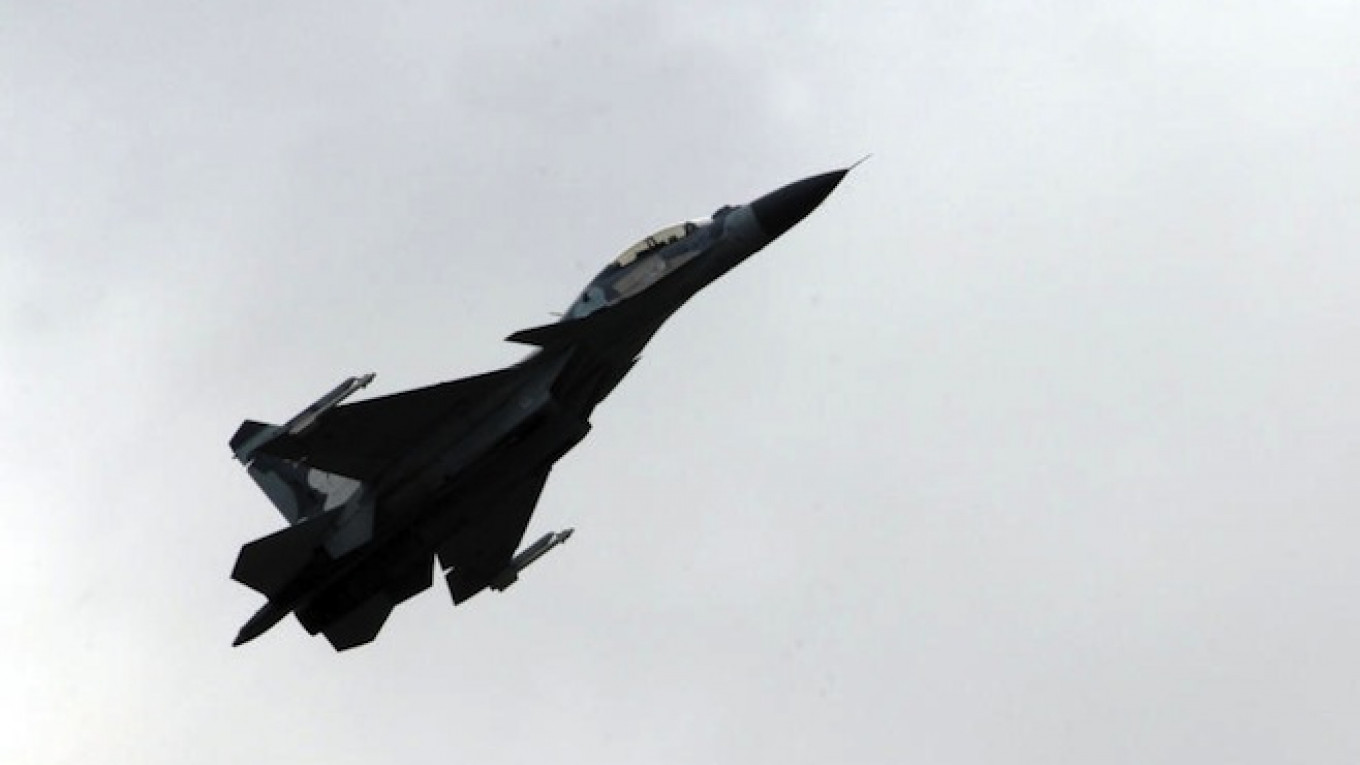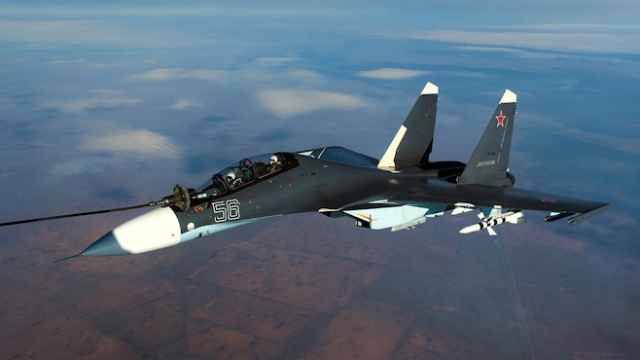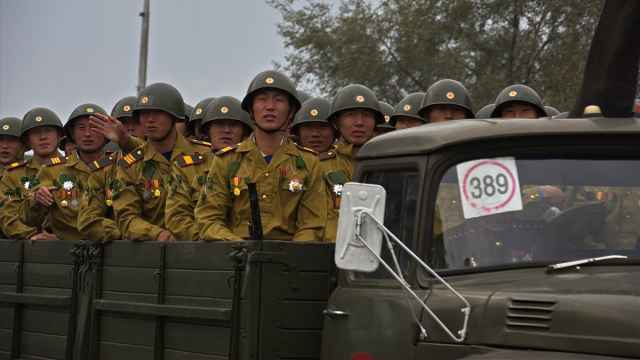After decades of isolation from the international arms market, Iran is gearing up for a military shopping spree. Lagging behind U.S.-equipped regional rivals, it has turned to Russia for assistance.
On Feb. 15, Iranian Defense Minister Hossein Dehghan landed in Moscow for a two-day visit. According to media reports, Tehran came with a $8 billion shopping list that included the high-end Su-30 warplane, Yak-30 training aircraft, military helicopters such as the Mi-8 and Mi-17, K-300 Bastion coastal defense systems, new surface ships, and even new diesel-electric submarines.
The Iranians are said to be most interested in the Su-30 multirole fighter, which would drastically outperform anything else in their arsenal. Under sanctions since 1979, Tehran's air force is currently an eclectic mix of Vietnam-era U.S. warplanes — such as the iconic F-4 Phantom and F-14 Tomcat — as well as old Russian and Chinese jets.
Russia is a good place to go for military equipment, especially for those who need hardware comparable to Western kit, but without the cash or wherewithal to purchase and maintain it.
It is a market in which Moscow flourishes. According to a report published by the Stockholm International Peace Research Institute on Feb. 22, Russia was second only to the United States in global arms sales.
Analysts calculate that Iran would need to spend up to $40 billion in the long term to fully revamp its museum-piece military. Nonetheless, $8 billion is a significant investment. According to Ben Moores, a senior analyst at the international defense consultancy IHS, such a budget would deliver “about 160 multirole fighters.”
This, he noted, was probably too many for Iran's needs. “They could also buy some ships, upgrade their [Russian-built] Kilo-class submarines, and perhaps buy some new frigates [and] additional air defense systems,” he said.
Taken as a whole, a multibillion-dollar Russian-Iranian arms deal would decisively change the balance of power in the Middle East. But the deal still requires agreement by the UN Security Council, where the United States has the right to torpedo the deal with its veto power.
Power Politics
The possibility of such a deal between Russia and Iran only became possible following the implementation of last year's landmark nuclear agreement between Iran and the international community.
Under the deal, sanctions against Iran were lifted in exchange for assurances that Iran is not working on developing nuclear weapons.
Following the signing of that agreement, which U.S. President Barack Obama argued would reduce the chances of Tehran going rogue with nuclear weapons, the UN Security Council also passed Resolution 2231. This resolution stipulates that for the next five years, Tehran will require the approval of the UN Security Council to buy military hardware abroad — with the exception of air defenses.
This catch effectively gives the United States veto power over any perspective Russian-Iranian arms deal in the near future. President Obama has been willing to give Iran room to maneuver in the past, and therefore may allow a sale. However, Obama's successor may not.
Elements of the Washington foreign policy community have been vocally opposed to Obama's efforts to engage Iran. The prospect of Tehran using its post-sanctions cash flow to revamp its aging military has been particularly controversial in such circles.
Ilan Berman, Vice President of the American Foreign Policy Council, a Washington think tank, described the Russia-Iran arms deal as a “strategic test” for the Obama administration. “Simply put, the administration is worried about Iran walking away from the nuclear deal, and as a result have taken to glossing over troubling Iranian behavior,” he said.
What a Russian-Iranian arms deal would look like
The Obama administration is likely to counter criticism of its Iran policy by pointing to parliamentary elections held in Iran over the weekend, which were the first held since the deal was signed. In the election, reform-minded “moderates” broke a strong conservative majority.
However, Berman saw little cause for optimism in Iran's reformist ticket. “There are a lot of names on the ticket that should give people serious pause — from human rights abusers to internationally sanctioned entities,” he said.
The U.S. administration claims to be keeping a close eye on the Russia-Iran arms deal, but Secretary of State John Kerry has said that he did not anticipate Washington would use its UN Security Council veto to prevent a sale.
International affairs expert Vladimir Frolov said that he does not anticipate Russia will be punished for any attempt to sell arms to Iran. Even if the United States vetoed a deal in the Security Council, Russia and Iran could sign agreements for a weapons delivery when the resolution expires in five years, he added.
Regional Implications
The conflict in Syria has brought Russia and Iran closer together — both back the regime of Syrian President Bashar Assad. In April 2015, President Vladimir Putin personally lifted a self-imposed ban on selling Iran advanced S-300 air defense systems.
That ban, imposed in 2010, marked a serious rift between Russia and Iran. It saw Moscow unilaterally pull out of an $800 million arms agreement with Tehran, a move that was widely interpreted as a gesture of goodwill to the West, which was concerned by Iran's nuclear ambitions.
Putin's new efforts to court Iran and move forward with new arms deals certainly appear to have paid off. What is less clear is the extent to which the new sales mark a sign of a new political and military alliance.
Russia and Iran share interests in the Syrian conflict, and resisting western influence in the region, but beyond there there is no obvious shared agenda.
Both have their own competing concerns to balance. Russia will want to ensure equipping Iran with a modernized military does not further alienate Moscow from the Sunni Arab countries. There is an additional risk of estrangement from Israel, which has expressed concern over Russian weapons landing in Iranian hands.
Russia could easily upset the region by selling too much heavy-duty equipment to Iran. There is, at least on paper, a large disparity between Iran's military capabilities and those of U.S.-backed Middle Eastern states like Saudi Arabia and the UAE. Turkey, too, is a major U.S. customer.
These U.S. sales, which have gone into overdrive in the last several years, put Tehran's aging F-4s, F-14s, Russian-built MiG-29s and their Chinese counterparts at a disadvantage.
Russia is simultaneously seizing market opportunity, and seeking to check Washington's influence in the region. In doing so, Russia would give Iran a military it can use against its U.S.-supplied rivals in the Middle East.
And the stakes could not be higher. Tehran is already fighting a proxy war against those rivals in Syria. As the United States and Russia continue to arm both sides, the risk of Syria sparking a region-wide war increases.
Contact the author at m.bodner@imedia.ru. Follow the author on Twitter at @mattb0401
A Message from The Moscow Times:
Dear readers,
We are facing unprecedented challenges. Russia's Prosecutor General's Office has designated The Moscow Times as an "undesirable" organization, criminalizing our work and putting our staff at risk of prosecution. This follows our earlier unjust labeling as a "foreign agent."
These actions are direct attempts to silence independent journalism in Russia. The authorities claim our work "discredits the decisions of the Russian leadership." We see things differently: we strive to provide accurate, unbiased reporting on Russia.
We, the journalists of The Moscow Times, refuse to be silenced. But to continue our work, we need your help.
Your support, no matter how small, makes a world of difference. If you can, please support us monthly starting from just $2. It's quick to set up, and every contribution makes a significant impact.
By supporting The Moscow Times, you're defending open, independent journalism in the face of repression. Thank you for standing with us.
Remind me later.







